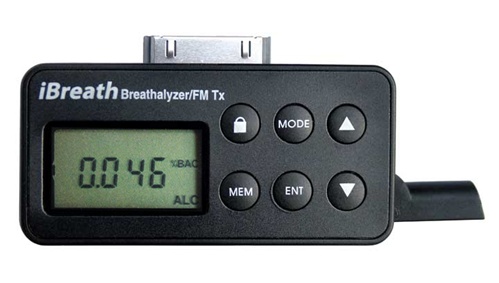 If you've been hanging around Indiegogo, you may have noticed a new trend in smartphone-connected devices: the smartphone breathalyzer. Three companies have shown up with smartphone breathalyzers on the crowdfunding platform in the last few months, with two more launching independently, and at least three of the products claim to be (in these exact words) "the world's first smartphone breathalyzer" -- despite those claims the honor almost certainly goes to the now-discontinued iBreath iPod breathalyzer, which came out back in 2009.
If you've been hanging around Indiegogo, you may have noticed a new trend in smartphone-connected devices: the smartphone breathalyzer. Three companies have shown up with smartphone breathalyzers on the crowdfunding platform in the last few months, with two more launching independently, and at least three of the products claim to be (in these exact words) "the world's first smartphone breathalyzer" -- despite those claims the honor almost certainly goes to the now-discontinued iBreath iPod breathalyzer, which came out back in 2009.
Portable breathalyzers are nothing new, and a native screen can easily deliver the basic functionality: estimating the user's blood alcohol level based on their breath, to help individuals determine when they're too drunk to drive. But for this new wave of hip smartphone breathalyzers, the connected app offers a range of value propositions -- from blocking you out of your social media when you're too drunk to be posting, to connecting to your social media to share your social drinking, to tracking your alcohol consumption over time, Quantified Self-style.
Of course, breathalyzers are considered to be medical devices by the FDA, and based on searches of the FDA's database and the companies' websites, it doesn't appear that any of the devices below has secured 510(k) clearance. Most are still in preorder, however, and most say they are seeking that clearance and will have it prior to shipping their devices. The question is whether the iPhone connectivity substantially changes the functionality of a portable breathalyzer -- if it doesn't, clearance shouldn't be any harder for the companies to secure than legacy devices.
Here are six smartphone-connected breathalyzers that are either launching, launched, or (in one case) already discontinued:

This iPod-connected breathalyzer was available as early as 2009, according to this product review from breathalyzer review site AlcoMeters. The review also suggests a reason why this early device may have ended up discontinued: although it had a plug for connecting to an iPhone, it didn't have an app, so the phone really just acted like a power source for the device. On top of that, there's no evidence that the device was even submitted to the FDA, and AlcoMeters questioned its accuracy.
















